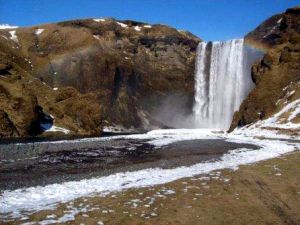Iceland
 (Photo: Arctic Portal) Skógafoss, Iceland
(Photo: Arctic Portal) Skógafoss, Iceland
Located in the North Atlantic Ocean at the Mid Atlantic Ridge, being the Nordic European country, Iceland is coming up as one of the year´s top travel European destinations. It is out of question that Iceland offers a unique pristine nature, outstanding landscapes and vibrant culture deeply rooted in ancient heritage. Affable business environment with abundance of competitively priced renewable energy and solid, modern infrastructure attracts skilled workforce and new foreign investments.
Tourism industry has become a significant part of Icelandic economy. Statistics show that it contributes to almost 5% of country's GDP what gives the amount of 73.1bn ISK from foreign travelers. According to Central Bank of Iceland, more than 75% of this figure was estimated as purchases of goods and services while 25% were purchases of passenger fares.
There are five major ports of entries, situated in the southern, northern and eastern parts of Iceland. According to the Icelandic Tourist Board, more than 500 thousand visitors arrive via Keflavik and Reykjavik airports every year with scheduled flights from all parts of Europe, Canada and United States. Close to 20 thousand tourists use direct connection through Seydisfjördur, Akureyri and Egilsstadir airports as the scheduled fares are mostly available during the summer period.
 (Photo: Arctic Portal) Mývatn, North Iceland
(Photo: Arctic Portal) Mývatn, North Iceland
There are close to 60 thousand guests travelling to Iceland by cruise ships every year, mostly via scheduled fares during the summer period. The largest port of entry for the cruise vessels is located in Seydisfjördur but approximately 95% of those ships have a stopover in Reykjavik, some of the ships come to northern part of the country, entering the island via the port of Akureyri. The location of significant ports of entries for marine traffic could be seen on Interactive Mapping System.
According to Icelandic Statistics Office, outstanding number of visitors comes from the Nordic countries, United Kingdom, Central and South Europe and North America. Most of those people, close to 50% visit mainly Capital region, 20 % travels up north, but only 11 – 15 % visit southern, eastern or western part of Iceland.
Development of tourism industry brings challenges and opportunities for Icelandic government. Opening of new Arctic shipping routes and establishment of new hub ports will greatly influence a marine traffic to Iceland. Having a large impact on country´s economy, tourism industry gives an employment to over 10 thousand people.
It was measured that over one million visitors will come to Iceland in 2020 what. The annual increase of the foreign traffic is estimated for almost 9%. However the UN World Tourism Organization as regards the increase of travelers globally, the Icelandic Tourist Board estimate that close to 800 thousand foreigners will choose Iceland as the travel destination.








